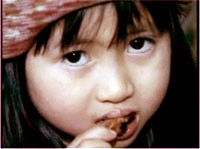Buddhist monks and nuns praying in the Buddha Tooth Relic Temple of Singapore
Wikimedia
For Buddhists, quite unlike most major religions—like Islam, Judaism, and Catholicism—food choices in general are mostly affected by cultural and personal preferences, and local traditions and availability of ingredients, rather than by religious beliefs.
Unlike most major religions and world philosophies, Buddhists do not have specific food prohibitions. Buddhist cuisine does, however, emphasize its general non-violence principle of ahimsa, doing no harm, in this case to animal life. Very strict Buddhists thus sometimes eschew not only meat but also dairy products.
However, Buddhist Philosophy/Religion does strongly influence food consumption. For e.g., in addition to following a vegetarian diet, the contrasting forces of yin and yang are balanced and harmonized in food and cooking. And one can go to herbal medicine restaurants where the maitre d' "prescribes" meals according to the ailments of each diner.
Buddhist cuisine is basically an East Asian plant-based cuisine influenced to a large extent by India, where Buddhism began in the 6th century B.C., and China, where Buddhism is today a main religion.






